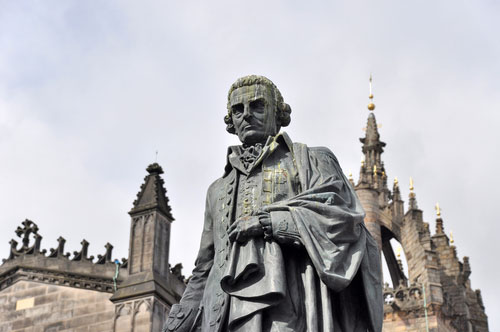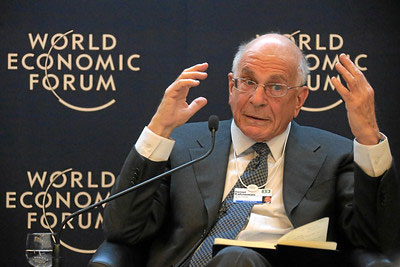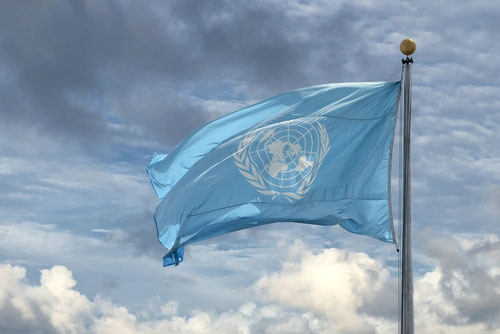Why does the market economy have a hard time taking ecology into account? Why don’t economic and political actors give more importance to environmental issues? The reasons why this happens are likely to lie in the structure of our market.
At the moment, ecology is increasingly recognized as a political priority. At each election, plenty of all candidates adopt an ecological posture and claim they’ll put in place policies to fight global warming, limit the degradation of ecosystems, preserve natural resources or biodiversity.
Yet, either things are not moving forward or progress is happening really slowly at an invisible pace. Every year, global CO2 emissions continue to increase, little progress is made regarding waste reduction and circular economy policies and biodiversity keeps disappearing. The natural capital isn’t yet considered more than an “externality” in economic equations, the commitment of companies through their CSR policies is quite insufficient, e-waste keeps rising while repairing is a distant reality: in short, it looks like things have stagnated.
Even many concerned citizens trying or claiming to be eco-friendly often have trouble adopting effective behaviors when it comes to consuming more responsibility or giving up some polluting practices. Either because they aren’t aware of how polluting their actions really are (for instance, driving a car can be just as bad as flying) or because some habits are just too hard to change – because of convenience issues, time, price…
But why does this paradox exist? Why is ecology, supposedly at the heart of political, civic or corporate discourses, almost always dismissed to the backstage instead of becoming a true priority? Are all decision-makers completely unaware of what 99% of scientists are saying about how climate change is coming and its devastating effects? Are all corporate leaders evil? We explore these issues under the perspective that the problem lies within the structure of our economic and social systems. Let’s take a closer look.
The Market Economy: The Dominant Economic Model

Generally speaking, the global economic system can be described as a “market economy”. Basically, a market economy is an economic system in which decisions (to sell, buy, produce, consume) are taken from the confrontation of supply and demand in a market where actors are free. In a market economy, actors (companies, individuals, the state…) produce goods and services that someone else will consume. The price of these goods (but also the amount of money, wages…) is determined by the law of supply and demand: the more a good is sought, the more expensive it is.
In theory, in a market economy, the system equilibrates itself because individuals make rational, utilitarian decisions (this is called the general equilibrium model). If a producer sells a good that’s too expensive, no one will buy it (the demand drops) and the producer, rational, will be forced to adjust his behavior (lower the price) to sell again.
In theory, this system produces an optimal economic situation as the decisions of the actors are rational. Everyone has an interest in working (to make money), producing something useful (that people will buy) at a reasonable price, everyone works and benefits from the work of others … In short, everyone wins. But for that, each individual must be free to make his decisions: which means there has to be free competition, free circulation of people, free trade of products…
The Generalization Of The Market Economy And The Ecological Problem
This system, based on the ideas of liberal economists from the 18th and 19th centuries, has been adopted around the world. Thus, progressively, the majority of countries in the world (and strongly in Europe) have lowered their tariff barriers, liberalized their economies, given more freedom to companies and entrepreneurs, considering that maximizing economic production would maximize the welfare to be global.
And it worked pretty well. Without a doubt, the spread of the liberal economy has produced a large amount of economic wealth. It has contributed to the major development of humanity for the last two centuries, it has helped to bring out many innovations in many fields. Industries in general developed, agriculture got modernized and all this helped to feed and support the needs of a growing population. Extreme poverty was reduced, fewer people are hungry, literacy and health improved… Overall, today, we feed better, heal better and live better today than ever before in human history.
But this has also (in the big majority of cases) accidentally, produced negative consequences for the environment (and society) such as pollution of the air, land and water, global warming or the degradation of biodiversity. We know since the 1980s that these issues will challenge the ability of our economic systems to be productive and even to survive in the (now) short-medium term. Yet we continue on the same path. This is not very “balanced” or “rational”, right? It is as if the economic system, for 40 years, had been unable to take into account ecological constraints and adapt to them – especially since the capacity of adapting is, in theory, how a market economy works.
However, it seems the market economy regulates well only when it comes to short-term adjustments such as price, interest rates or wages. For example, if there is little cash in circulation on the market (in bank reserves for example) and many players want to borrow money, interest rates go up. It then becomes harder to borrow, which lowers demand and regulates the rate. Conversely, if you have a lot of money in circulation and comparatively few players willing to borrow to invest in projects, then the rates go down. Ditto for prices, or wages. In summary: anything that represents a quantifiable cost generally fits fairly well in a market economy.
But the market economy seems to have difficulty taking longer-term issues into account, especially when they are non-monetary, such as ecology. Let’s take an example. CO2 emissions are on the rise, we know that they deregulate the climate to the point that it endangers our societies, and yet all economic actors continue to increase their CO2 emissions year after year by consuming energy fossils. At first glance, it’s not very rational. And yet, in a market economy, it makes sense.
The Problem Of Taking Ecological Issues Into Account In The Market Economy

First, because in reality, individuals are never 100% rational. And we can see this very well in our everyday life: a person wishing to lose weight to preserve their health many times ends up picking a desert at the end of a meal already well-stocked, while rationally, they should do without it.
This makes sense: as much as it is easy to rationally evaluate a phenomenon that affects us immediately (like getting burned when we touch a hot pot) it becomes more complicated when we talk about diffuse phenomena taking place over a period of time. A desert doesn’t mean extra weight, rather, it’s the repetition of the action over time that ultimately causes the problem. And it’s the same for ecological problems: 1 ton of CO2 in the atmosphere does not change anything, it is their accumulation that creates the problem. The incentive to act rationally is therefore less obvious. These biases in decision making are a fundamental analysis theme of behavioral economics.
On the other hand, in a market economy, economic actors are subject to cost logic. As we have seen, what creates the adjustments in a market economy are prices (and therefore costs). The data on which actors rely to choose are therefore essentially monetary data: how much does my workforce cost, how much do my resources cost, at what price can I sell, what is my profit… So obviously, as the ecological crisis doesn’t cost anything to these economic actors (companies, consumers…), at least for now, it does not affect their capacities or their earnings. Then again, the incentive to change behavior is weak. And it’s even worse than that.
Indeed, very often, adopting an ecological behavior represents a cost (at least initially). For example, choosing raw quality materials that are sustainably grown is often more expensive for agribusiness companies for example. Long-term community interests (such as ecology) are therefore inconsistent with short-term financial interests (or with the ability to maintain a stable life) Take the example of the rise in gasoline prices at the origin of the movement of yellow vests in France: rising prices to lower demand as an ecological policy had a high cost on people’s lives.
Ecology: A Prisoner’s Dilemma In A Market Economy

In fact, taking into account issues such as ecology in a market economy translates into a sort of global system of prisoner dilemmas. The prisoner’s dilemma is a concept of the game theory describing a situation where players would be interested in cooperating, but where, in the absence of communication and consultation, each person has an interest in betraying the other. The classic example of the prisoner’s dilemma is a situation where two accomplices of a crime are detained by the authorities separately, without the possibility of consulting each other. The authorities do not have enough elements to sentence the two suspects to heavy penalties: if they do not say anything, they will get 2 months in prison. But the authorities offer a deal to each of the prisoners: they can get released if they turn in the other accomplice, who will then take a heavy sentence of 5 years. Moreover, if both suspects turn each other in, they both get a moderate sentence of 2 years. They don’t know whether the other will denounce them.
It is clear from this example that in theory, the prisoners would be better off not saying anything: they would then be out after 2 months. But since no one knows what the other will do, everyone is faced with a dilemma: if they say nothing and the other charges them, they will take 5 years. If someone charges their accomplice and he says nothing, the one presenting charges will be released. And if they both speak they will only take 2 years. In this situation, the rational choice is therefore to denounce the other person, even if one risks taking 2 years instead of only 2 months if everyone was silent.
The prisoner’s dilemma illustrates how sometimes individual interests and collective interests don’t exactly converge, and this applies very well to the ecological problem. In the long term, each individual actor has an interest in cooperating by adopting an ecological attitude: this is the only way to avoid a global crisis. But individually, this action has a cost: change production models, switch to renewable energy (with future costs we’re ignoring today), not selling pollutants even if they are requested by consumers… Nothing allows one to know what other actors will do: will they commit to ecology or do nothing? Because if I’m the only player getting involved, then I risk losing market share because my costs will increase and I will not be competitive anymore. In the long run, I can even go bankrupt.
Market, Ecology, And Profitability

Mind that in an economy driven by the logic of cost and competition, economic actors need to remain competitive, meaning they’ll only have the economic interest of engaging in ecological practices once they’re somehow profitable. For instance, the renewable energy market developed because the price of fossil fuels began to rise and alternative solutions were sought. With public subsidies for renewable energies that made such investments more interesting, more and more efficient systems have been developed. Renewable energies then became progressively more profitable and a new big-size market was developed.
The organic market is another example. The model of organic farming has existed since the 1920s but it remained unprofitable in the face of intensive chemical-rich agriculture. In the 1970s, the model of organic farming became institutionalized, but it continued to grow slowly: it was still significantly more expensive and therefore it was difficult to find customers. Today, even though more and more consumers are willing to pay more for organic farming, it still represents a small market share of the global food market.
Apparently, “green” markets develop when a breakeven point is close to being reached. However, since the ecological crisis does not cost the economic actors much, this threshold is rarely reached and when it ends up being achieved is often due to an external phenonema to the market: a geopolitical crisis, a public subsidy, a tax…
Ecological Regulations Of The Market Economy
For all these reasons, some economists believe that to better take into account long-term phenomena such as ecology and to overcome the lack of information, consultation, and market data, it is the government that must have a regulatory role.
It would be up to the state, for example, to pass on the cost of pollutants to producers (according to the polluter-pays principle), to establish regulations that forbid certain practices, or to create taxes like the carbon tax that would apply to everyone. In theory, the idea works very well: it taxes the polluting products, which must in contrast make the less polluting products more competitive.
Yet, even at a time when citizen demands for ecological protection have never been greater, governments are actually doing little to regulate ecology and only a fairly small share of public financial resources really goes to ecology. Why?
Regulating Ecology In A Competitive World

Again, part of the problem may be related to our economic system. Indeed, one of the essential roles of governments (the role they’re assigned by citizens who elect them) is to maintain an economic system that is beneficial to their country: a system that creates jobs, wealth, well-being and comfort. Today, even though people are concerned about ecology, they’re also interested in keeping their jobs, their comfort and their living standards. So within this context, the role of the state is a little paradoxical. It must regulate the market economy, set up ecological taxes, regulations, prohibitions, and at the same time, guarantee the sustainability of the economic system, protect jobs, keep or increase purchasing power and competitiveness.
And no doubt about all the benefits of globalization. But moving forward in ecological matters in the midst of a globalized and competitive economic system is difficult. For whatever country, establishing a carbon tax high enough to have an impact on our CO2 emissions would mean losing competitiveness. In the long term, it could mean losing jobs and after losing purchasing power. Moreover, some studies have shown that the carbon taxation attempts implemented in the OECD had a negative impact on the competitiveness of many energy-dependent companies between 1992 and 2008, particularly in countries where the tax is implemented in countries that are importers. Other studies have shown that environmental regulations, have, in general, a negative impact on the competitiveness of companies.
Of course, ecological regulations do not only have a negative effect on the economy: they also facilitate the transition to new production models, thus allowing access to new markets, thus new creating jobs. This has been shown in a report published by researchers at the London School of Economics in the Review of Environmental Economics and Policy. The World Bank makes the same kind of conclusions in its report on this subject. But the conditions for ecological policies to have a positive effect on ecosystems and on the economy at the same time are difficult to bring together. Financing the transition through debt? It’s hard to achieve in the international monetary system. Tax? Hard to achieve under a competitive context.
The Challenge Of Finding International Consensus

Governments are, in a way, facing the same prisoner’s dilemma as other economic actors: they can not act alone without jeopardizing the competitiveness of their economy. To avoid the impasse, it would then be necessary to be able to establish an international consensus. If all the countries of the world were able to agree on a global economic policy integrating the environmental and social externalities in the economic costs, then the market economy could be regulated to better protect ecological and social systems. This would avoid that a single country had to risk sacrificing its competitiveness while others did nothing.
But again, this is a tremendous challenge. How can we push nearly 200 countries with divergent interests to agree on such broad and compulsory rules? For example, how can developing countries, which still have to deal with hunger, extreme poverty and health insecurity, be forced to give up cheap sources of energy that allow them to develop? How can governments and companies stop or limit the exploitation of certain resources even though thousands of jobs depend on it? All international negotiations are the subject of power and opposition regarding these subjects. At the heart of the Paris Climate Agreement, for example, is the question of financing: how should/can developed countries, the ones most responsible for the greenhouse gas increases, finance and support the transition of developing countries?
For all these reasons, it is very hard to get an international consensus ambitious enough for a global ecological policy to be reached. In history, at a global level, very few negotiations on these topics have really succeeded. The only good example is the Montreal Protocol on the Ozone Layer, which has allowed for the gradual ban on CFCs (chlorofluorocarbons). But for this case, all the economic conditions were in place: CFCs already had a viable alternative (HFCs or Hydrofluorocarbons), the economic stakes were low, few jobs were threatened … In addition, twenty years later, we have found that replacing CFCs with HFCs had not only positive aspects: the latter having a warming power 53 times greater than CO2. And another international conference (Kigali) had to take place to solve this new problem: at the moment without much success.
Ecology Versus Complexity
In fact, all this illustrates one of the great paradoxes of ecology. While in theory, ecology seems simple (it would be enough to agree to consume less or to say politicians have a simple solution to fix this they just don’t want to) its actual implementation is much more complex. Ecology is in permanent competition with other issues, particularly economic and social issues. And since the international, liberal and competitive system by nature makes dialogue and cooperation very difficult, ecology is often disregarded as a priority, and other more urgent issues get the spotlight.
Yes, the ecological situation then seems somewhat locked … All the effective solutions for this crisis seem unrealistic in such a context. Too many blockages and inertia are inherent in the international and political structures, making it hard for cooperation on ecology to emerge. At the same time, changing this system from the root seems idealistic as well: it would require international consensus and a massive transformation of our legal, economic and social structures. And even if one or more states decided alone to embark on an economic revolution, their weight would probably be insufficient to influence the dynamics of the rest of the world (assuming find a way to stay economically strong).
The space of action is therefore ultimately quite limited: surface reforms are possible, such as the introduction of light financial and fiscal incentives, or weak regulations. This is the case for example with eco-taxes or eco-participations, recent tests on the carbon tax or international agreements like the Paris Agreement … But this is for the moment far too insufficient to solve the environmental crisis. Will we achieve a more global, deeper and collective commitment to deal with this crisis? How? While this is not the billion-dollar question, the answer might be the solution to saving our planet.
Image credits to Adam on Shutterstock, banknotes on Shutterstock, world on Flickr, flag on Shutterstock, jail on Shutterstock and lens on Shutterstock

